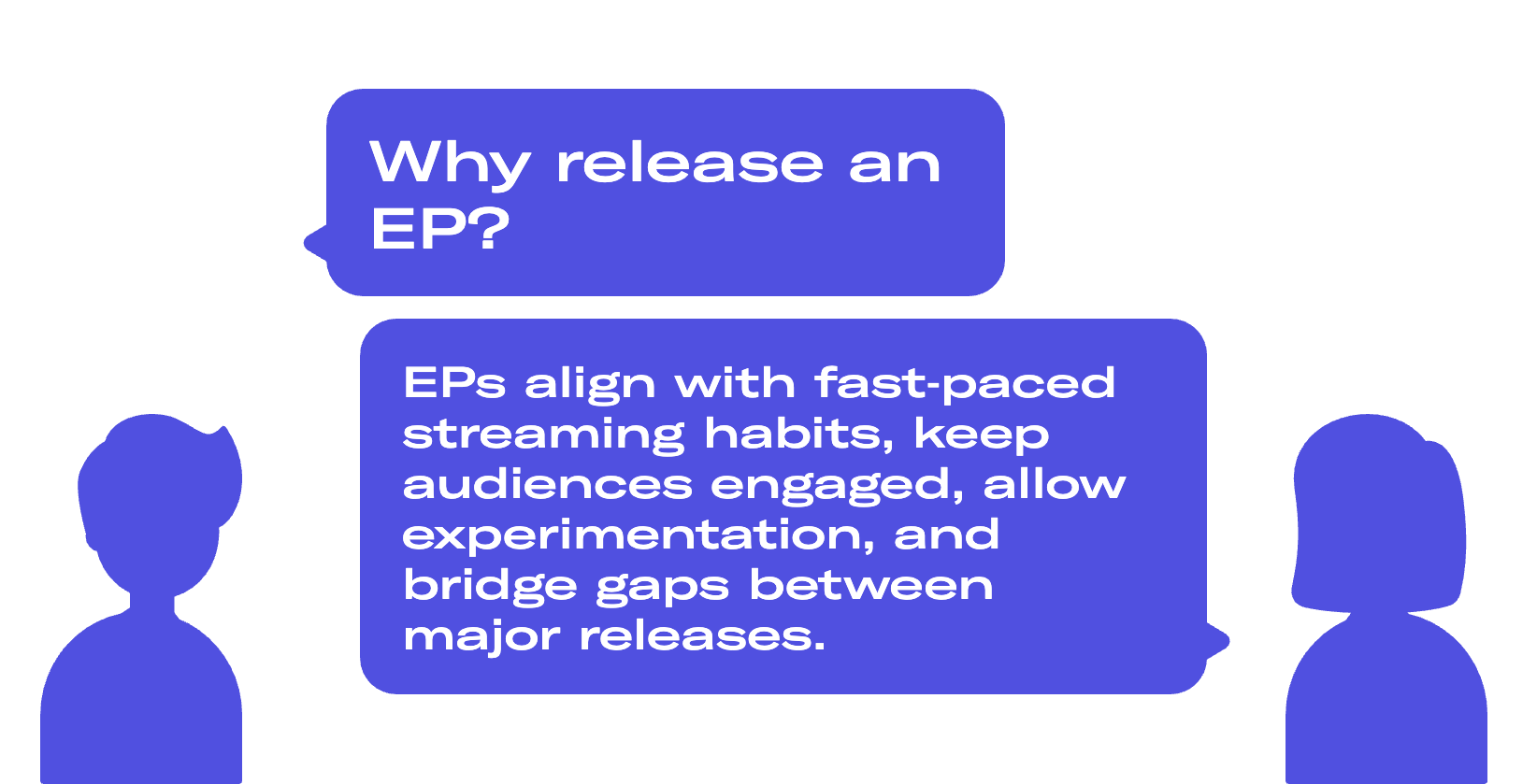EP vs album: Which Is the Best Format for Your Music?
Deciding between releasing an EP or an album is a critical step. More than simply the number of tracks, it involves careful consideration – the stage of your career, the platforms you'll use, the type and size of your audience, your musical goals, and more.
Deciding between releasing an EP or an album is a critical step. More than simply the number of tracks, it involves careful consideration: the stage of your career, the platforms you'll use, the type and size of your audience, your musical goals, and more.
We want to make this decision easier for you.
At our Recording Studios in London, TYX has helped many artists (big and small) create successful albums and EPs. We’ve been around long enough to know what works and why. We can lay out the real benefits of EPs and albums so you can see the trade-offs clearly. The choice is yours.
This guide gives you the tools to decide with confidence, start strong, build momentum and refine your sound.
What's the difference between EPs and Albums?
The main difference between an album and an EP is pretty simple.
It comes down to:
- The number of tracks: How many songs are included in the tracklist.
- Total running time: The length of the entire project.
An album, also known as an LP (Long Play), is a complete collection of music. As a rule of thumb, stores treat an album as seven or more tracks, or any release over 30 minutes.
An EP (Extended Play) typically has four to six tracks and runs 30 minutes or less.
Distributors deliver your release; stores apply the Single/EP/Album label based on track count and total run time.
EPs are great for new artists trying to break into the scene or those wanting to drop something fresh without the wait.
Albums require more time and effort but can make a big statement, potentially leading to more opportunities in the music industry. Both have their place, so you need to pick what fits your current situation and goals.
How the music industry has changed
Record companies no longer hold the power and influence they once did. In the last 20 years, there's been a rapid shift towards music streaming services and social media platforms. This has fundamentally changed how music is made, released, and consumed.
One thing is crystal clear: EPs are on the rise, and there's a good reason for that.
While there may be fewer "gatekeepers", not everybody views these changes for the better. Artist remuneration from streaming is an active UK policy discussion; government and industry continue to review transparency and outcomes.
And making it as a smaller artist is arguably harder than it ever has been.
If indie artists want to succeed in this new world, they must adapt. So, before you begin working on that new album, or release an EP, you must have a rough understanding of the economics of this system.
Here are 4 key points to remember about the industry today:
1. Measurement and revenue
For UK charts, eligible album streams are aggregated and converted at 1,000 streams to one album sale after track capping and weighting This system has reshaped how artists think about releasing music. Given the volume required for significant revenue, artists often consider shorter, more frequent releases (EPs) to maintain engagement and visibility on platforms like Spotify and Apple Music.
2. Engagement over physical sales
With streaming services driving most of the music industry's revenue, the emphasis has shifted from selling physical copies to engaging listeners online. Artists are now more likely to release EPs to keep their audience engaged between full album releases, adapting to the rapid consumption habits fostered by streaming platforms.
3. Promotion and marketing
Streaming platforms offer a unique way to promote music, such as playlist placements, which can significantly boost an artist's visibility. This environment favours the release of singles and EPs, which can be more easily added to popular playlists, over traditional albums.
4. Virtual concerts and social engagement
Live has fully returned. Keep digital engagement and short-form content in the mix to sustain discovery between shows and releases.
What's the right format for your audience?
Now we get to the crux of it. First, when targeting your music releases, you need to understand the listeners you're targeting:
- Explorers : These listeners are always on the hunt for new music. They're the first you'll want to catch with something intriguing.
- Intrigued listeners : After grabbing their attention, these folks have shown a bit of interest. They're your opportunity to build a core community.
- Superfans: The ultimate goal. They started as explorers, got intrigued, and now can't get enough of your music.
Each release, whether an EP or album, should strategically cater to where these listeners are in their journey with your music.
What are the benefits of EPs?

The shorter format of the EP aligns well with the fast-paced consumption habits on music streaming platforms, where listeners often seek fresh, concise content. EPs serve as a strategic tool for keeping audiences engaged by regularly providing new material (without the long gaps accompanying album production).
They also allow you to experiment with your sound or explore new musical directions without committing to the extensive tracklist of an album. They work for both new artists (who want to create a presence) and established artists (for testing new ideas).
Platforms like Ditto Music have made the distribution of EPs simpler and more accessible. Ditto Music enables artists to reach global audiences without major label backing. This accessibility encourages a more dynamic interaction between you and your listeners.
For artists at any career stage, EPs can act as a bridge between major releases, maintaining fan interest and building anticipation for future albums. By leveraging the flexibility and efficiency of EPs, you can remain relevant and connected to your fan base.
1. Harnesses modern listening behaviours
The strategic release of singles from an EP can lift visibility through playlist pitching. Screen-logging studies show we switch tasks and content very frequently online, often within seconds. Meta-analyses link heavy media multitasking with small, reliable drops in inhibitory control and working memory.
It’s no surprise that shorter release cycles and bite-size content perform well on streaming and social.
2. Keeps the momentum going
Building a music career is a marathon, not a sprint. For emerging artists, the challenge isn't only in capturing attention but maintaining it. Releasing an EP allows you to keep the conversation going with your audience, offering new material at a pace that can keep engagement high without the overwhelming pressure and financial burden of producing a full-length album.
3. Flexibility and experimentation
EPs offer a unique opportunity to experiment with your sound or thematic content without the commitment of an album. This can be particularly valuable for artists exploring new directions or refining their musical identity. By gauging the reaction to an EP, you can gather insights and feedback that inform future projects. This ensures a later album release resonates with your audience.
4. Bridges gaps and building anticipation
Consider an EP as a narrative bridge between major releases, or a teaser that hints at what's to come. This strategic use of EPs can generate excitement and anticipation for an upcoming album, while keeping your audience engaged with fresh content. It can help you explore and expand your musical narrative, setting the stage for a more comprehensive work.
How to plan your EP release
The approach to releasing music should be as carefully crafted as the music itself. With EPs, you can leverage the strategy of drip-feeding singles to build anticipation, allowing each track to shine and potentially land on coveted playlists. This selective process maximises exposure and allows for real-time feedback, enabling you to align your artistic direction with your audience's preferences.
For releasing an EP, consider these steps:
What are the benefits of albums?
.png)
Now we get to the gold standard of music releases. What can we say about albums that you don't already know? After all, there's a reason those "Top Albums of All Time" lists get so many clicks. Despite their recent rise to dominance, we rarely see similar lists for EPs (food for thought).
LPs are part of the collective consciousness. A full-length album gives you an expansive canvas to weave intricate themes, emotions, and stories. This format provides the space to delve into elaborate concepts, allowing each song to contribute to a greater narrative, enriching the listener's experience.
Remember, making an entire album is a significant commitment. It showcases your unique sound, allowing for a deeper exploration of themes. Unlike EPs, albums are musical journeys for both creator and listener. They foster a more profound connection with your audience, offering a detailed insight into your vision.
Moreover, albums often serve as landmarks in an artist's music career. These pivotal moments can lead to greater recognition within the music industry, including awards and critical acclaim. With the traditional album format, you can create something timeless—a body of work that fans can return to, discovering something new with each listen.
Let's cover these musical monuments in more detail:
1. An artistic statement
An album differs from an EP in the sense that it is a more comprehensive artistic statement a deeper, more nuanced exploration of themes, stories, and musical experimentation. It's an opportunity to present a full piece that truly reflects your vision. Unlike EPs, albums allow for the unfolding of a narrative – a journey listeners can lose themselves in.
2. Cultivates a dedicated fan base
While EPs are excellent for attracting new listeners and maintaining engagement, albums play a crucial role in deepening the connection with your audience. They offer fans a fully immersive experience, transforming casual listeners into dedicated fans.
Albums are often seen as milestones in an artist's career, and the anticipation for these releases can significantly enhance an artist's profile and fan engagement.
3. Albums have longevity
Releasing your debut album is a significant undertaking that involves a considerable investment of time, resources, and creativity. However, this investment can pay off when it comes to your longevity and legacy.
Albums have the potential to stand as lasting works of art, defining moments in an artist's career and the music landscape at large. They offer a tangible piece of history that fans can return to, reinforcing an artist's place in the musical canon.
4. A counterpoint to the streaming era

Despite the rise of streaming and the shift towards single and EP releases, albums retain their importance. They provide a counterpoint to the transient nature of digital consumption, offering a more permanent, cohesive work that fans can engage with on a deeper level.
What's more, albums can drive significant streaming numbers as fans explore an artist's work in depth, leading to increased visibility and revenue in the long term.
How to plan your album release
The release of an album requires careful planning and strategy. From singles serving as precursors that build anticipation, to the timing of the release to maximise impact, every aspect must be thoughtfully considered.
Engaging with fans through storytelling, visual content, and interactive elements can enhance the album experience.
Releasing an album typically involves steps similar to an EP but on a larger scale. Consider these adjustments:
How to leverage social media in 2025
Most artists will not get a lucky break. An active online presence is the baseline. The goal is simple: turn casual listeners into fans who come back.
What to post
- Performances and process: Short live clips, rehearsals, writing moments, mix previews.
- Proof of momentum: Show press, playlists, gig posters, fan reactions.
- Conversation starters: Polls, questions, stitchable prompts, “choose the next single” clips.
- Fan features: Duets, covers, remixes, artwork. Credit people by name.
Make it easy to follow you
- Keep profiles current with links to your latest release, tour dates, and mailing list.
- Pin one post that tells new listeners who you are and where to start.
- Use the same artist photo, bio line, and link structure on every platform.
Post with intent
- Pick two primary platforms and one secondary. Do fewer, better.
- Set a simple cadence: three short videos per week, one community post, one live clip.
- Batch content for two weeks at a time so you are not chasing daily ideas.
Earn attention, do not chase it
- Open with the hook in the first two seconds.
- Put the song in frame. Show your face. Add captions.
- Write a call to action that asks for one thing: save, follow, or pre-save.
Tag and collaborate
- Tag venues, producers, session players, and brands when relevant.
- Reply to comments within the first hour. Save the good ones and reuse as overlays.
- Trade posts with artists at a similar stage. Share audiences, not just links.
Measure and refine
- Look at saves, completes, and follows per post, not only views.
- Use platform insights first. Add a simple tracker for post date, format, watch time, and outcome.
- Keep what earns saves. Drop what does not move people to act.
Keep the loop tight
- New song idea → 15-second sketch → fan votes on version A or B → studio clip → pre-save post → release day live video → thank-you post with next teaser.
- One clear story per month. One clear ask per story.
Final thoughts
EP or album is not the question. The real move is choosing what serves your next step. One format feeds momentum in quick bites. The other builds a world people can live in.
Pick your moment, set a clear goal, and plan the release like you plan the music. Tighten your story, line up your assets, and make every touchpoint earn its place.
Whichever route you take, commit. Ship work you’re proud of, learn fast, and keep the conversation with your listeners alive. The format is a tool. You’re the signal.
TYX Recording Studios: Elevate your project

Choosing format is a strategy call. At TYX Recording Studios in London, we map your goals, timeline, and budget to a release plan, then support you through tracking, mixing, and rollout so the music lands with the right audience.
From treated live rooms to professional vocal booths, and from mixing to mastering, our spaces are designed to bring out the best in your performance.
If you’d like advice on microphones or want to see how TYX can support your music career, get in touch or book a call with our team.
Frequently Asked Questions
Most albums have around 10 to 15 songs, though this can vary based on the artist’s vision.
EP means Extended Play. LP means Long Play.
Usually an album. Seven tracks (or any release over 30 minutes) will be treated as an album by most stores.
It depends on your stage and goals. EPs help you release more often, test ideas and build momentum. Albums deliver a fuller statement and deepen the bond with fans.
No. Stores typically list an EP as 4–6 tracks totalling 30 minutes or less. Longer or bigger packages list as albums.
We are open 24/7 to members, 9am-9pm for non members. If you need to book irregular hours please contact us directly by phone or through our web form.


















.avif)